The British League of Racing Cyclists may have brought about radical changes in road racing in the 1940’s but it was 1965 before some major steps occurred in competitive cycling. Hitherto, by regulation, open events less than 25 miles in length were restricted to women only. While club events could be held at any distance, anything shorter than 25 miles had not been considered manly so the incentive had not been there to alter things.
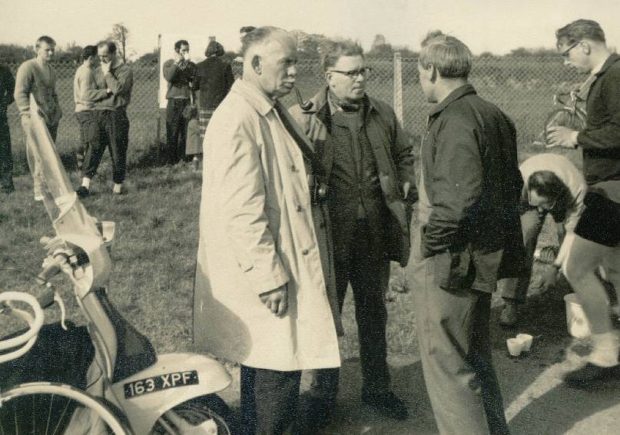
The Central Council for Physical Recreation (CCPR) had been formed as an advisory body that would eventually lead to the formation of the Sports Council. One of CCPR’s early moves was to increase the awareness and interest of school children in a wide variety of sports. The Inner London Education Authority followed this up in 1963-64 and did much to encourage youngsters to take up, amongst other sports, cycling. As more and more youngsters took an interest in the sport competitively, in 1965 the Road Time Trials Council opened up 10- and 15-miles time trials to juniors. By 1968 a separate competition was introduced for schoolboys (soon amended to encompass schoolgirls). In 1969, with lobbying from the clubs, the RTTC regulations for Open events were brought into line with those for Club events and males over 18 years of age could at last test themselves over 10 miles, usually on the fastest dragstrips they could find! In a similar manner, the British Cycling Federation encouraged the promotion of closed circuit and track events for the youngsters. While many were able to race in the name of their school others were keen to get into a proper club and the Addiscombe were keen to encourage these youngsters. If they were considered “too young” then the parent was also asked to join.
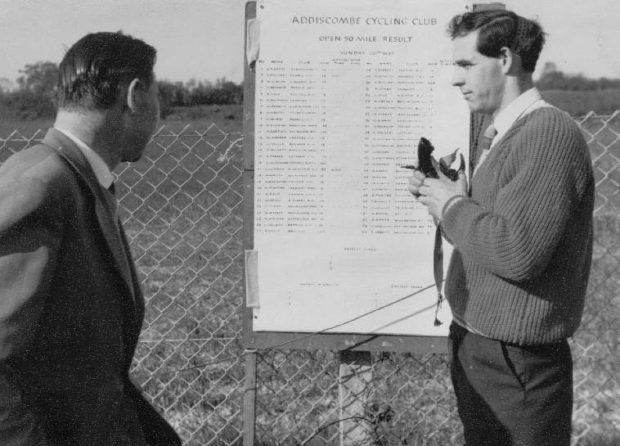
Track racing was generally at low ebb around the mid-1960’s though an unknown youngster called Alan Franklin, riding in the name of the Addiscombe, won a schoolboy race at the 1965 Herne Hill “Meeting of Champions”. He joined the club the following month! Doug Taylor won the SCCU Junior road race, John A. Smith finished 2nd with Taylor fourth in the Metro R.C. road race at Green Street Green, and Taylor was 3rd in the club’s Open Junior race at Lingfield, the senior event being won by John Sargeant, Norwood Paragon. At cyclocross, Dave Savage was placed on several occasions. Disappointingly, Doug Sheehy, Alan Withcombe and Roger Willoughby moved over to the younger Croydon R.C. at the beginning of 1965. There were still sufficient members racing “to keep the flag flying” but that was about all.
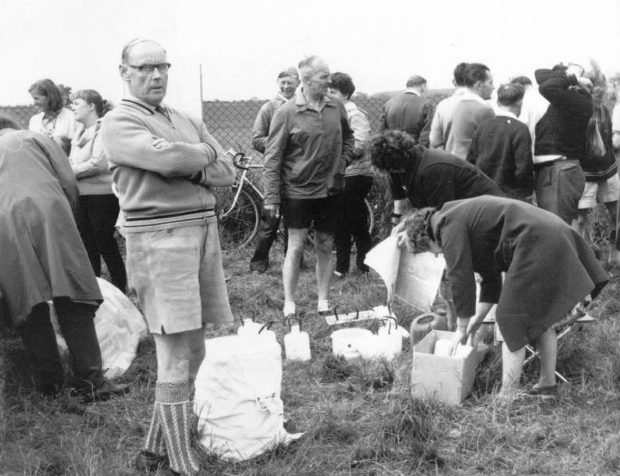
The committee agreed there should be a new trophy to perpetuate the memory of Charlie Davey and after much deliberation it was agreed this would be awarded annually to the fastest team in the Open 50. The winner of the 1965 event was Les Jackson, Morden C.R.C., with the Central Sussex C.C. (John Dutson, Alan Robinson, and Ken Atkins), being the first club to put their name on the Davey Memorial trophy.
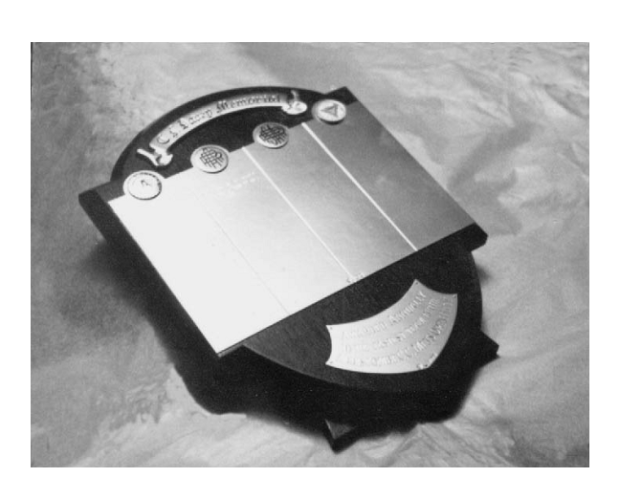
The start and finish of the 50 miles course was situated between Charlwood and Lowfield Heath, roughly at the end of the present Gatwick runway. For the next few years Eddie Mundy managed to book the meadow adjacent to ‘The Fox Revived’ PH at Norwood Hill and the 50 was followed by a club picnic.
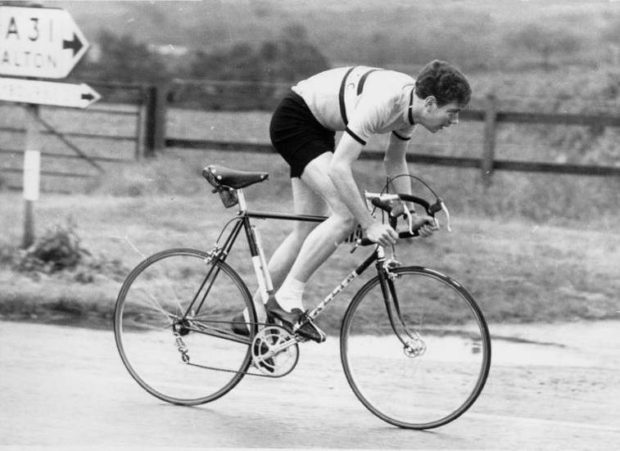
The club’s most prolific time triallist of 1965 was Sid Toole (pictured) and he ended the season by taking the 25-, 50- and 100-miles trophies, plus the Club Championship. He also won the George Fuller trophy for club/association events rang-ing from 25 miles to 12 hours and would repeat this win in 1966 and 1967.
Sid Armstrong and Ernie Mitchell were keeping the name of the club to the fore in VTTA events.
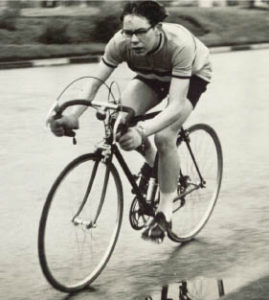
Another ride worthy of recognition was that of 19 years old Colin Davies (pictured) who notched up 235.75 miles in the Southern Counties (SCCU) 12.
An extensive programme of club events continued annually and with the demise of the inter-club with the Catford, the club events secretary John Watts arranged for members to join with the Norwood Paragon in the latter’s already established Purley to Brighton time trial. This became a keenly contested inter-club for several years – too often won by the Paragon!
A trial run of evening 10 miles club events proved popular and it was agreed to adopt this pattern in future with only early and late season 10’s having to be held early morning to meet lighting requirements. Due to a change of officers the club had missed applying for a date for an Open ’cross.
A film show and a forum, both held in April 1966, proved very successful and other film shows by Alf Conrad of the Clarencourt C.C. were arranged showing World Championships and continental races. An attempt to run a second forum however proved an embarrassing flop, perhaps because it was held mid-season? The club again participated in the Croydon Festival of Sports. The same month Ernie Mitchell flew to Paris to join with about 180 others in a Veterans Grand Prix. Paced by his son Eddie he had bad luck to crash after only a mile but rather badly cut and with his bike straightened out by his son, Ernie finished the 16.1 miles race in 45 mins. 28 secs. and received a medal and leather brief case for his effort. In encouraging others to participate another year he said it was worth it just for the five-hour lunch.
Following a spell away from Croydon, Mick Moseley had moved back to the area and proved a valuable asset. The number of time trials at the 30 miles distance had gradually declined but the Leo R.C. event saw three personal best rides by Sid Toole, Mick Moseley and Colin Davies giving them a new club record of 3.39.44. Lawrence “Larry” Grimes was the best junior of 1966 and was placed 7th in the Kentish Wheelers Novices 25. Toole and Davies went over to the Isle of Man to participate in the road race and time trials. Davies rode another good Southern Counties 12 with 236.5 miles to take 3rd place and 1st handicap and Moseley, riding events round the country, gathered up the 25, 50, 100 and Club Championship trophies.
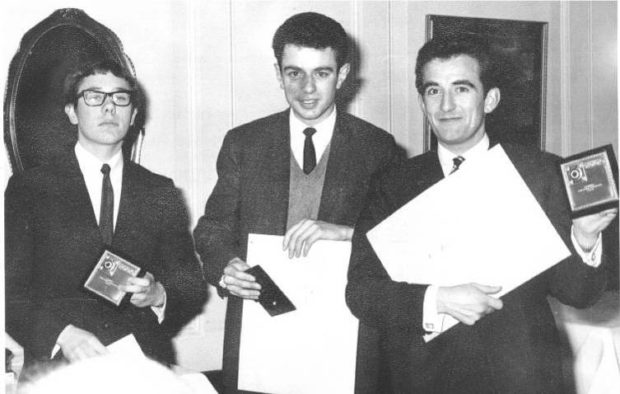
When promoting an Open event it is quite usual for someone to drive round the course, usually with a spare body or two on board, checking all the marshals are in position and if necessary dropping someone off to fill the gap. The 1966 Open 50 goes down in history not for the win by Ron Ford, Crawley C.C., in 2.00.12, nor the performances of the eight club members, but for the faux pas that left “the spare body” Paul Emmerson standing at his marshalling point long after the event had finished. The Minutes record that “although he returned home safely it was agreed to refund his bus fares”.
The Lingfield road races were still being run with full quality fields. Our main participants in this type of event were Mick Moseley and Fred Burrage. The Westerham Open cyclocross, perhaps fortunately, only attracted a small field due to a clashing event. Of the 34 entrants quite a few went off course due to a mischievous individual moving a direction arrow.
The camping party went to the Isle of Wight in 1966. John Briggs recorded a Falcon Cycles Training Camp in Majorca he joined with 29 other cyclists. A typical day, he wrote, consisted of a short walk or physical exercise before breakfast followed by a ride of approximately 40 miles and then lunch. An hour’s siesta was the preamble to a fast-training ride, groups of six learning how to echelon properly. Tea was followed by a lecture, dinner, then bed by 21.45 hours.
A year on and the camping party visited the New Forest. Among the more energetic members of 1967 Sid Toole, Eddie Mundy and Doug Taylor claimed the Davey Memorial team trophy in the Open 50, with ex-member Doug Sheehy taking the individual honours in the name of the Croydon R.C. Toole was 3rd fastest rider and Ron Breeze took 3rd handicap. A new scribe, John Grant, wrote entertaining “racing reflections” of his first 25 miles time trial, a 1.18.48 in the Southern Counties 25, and Colin Davies recorded his ride in the ‘Counties 12. (Re-reading these forty years later and comparing the accounts with the emails circulating, only the equipment changes, the effort and experience remains the same.) When fields were larger the ‘Counties ran at least two 50’s, with one being for riders not having achieved certain standards and the winner receiving the Tacagni Cup. As entries decreased only one 50 was promoted and the so-called second class 50 integrated. In 1967 the winner of the Tacagni Cup was Doug Taylor.
By the early 1960’s regular Sunday club runs with café stops had lost much of their popularity and were rarely advertised in The Gazette. Locally there was still felt to be a following for such a ride and in 1967 the Croydon & District C.A. experimented with a run on the first Sunday of each month. To a large extent runs depend on the enthusiasm of the Captain and Vice-Captain and round this period both Colin Davies and Stan Harvey endeavoured to keep Addiscombe club runs alive and interesting.
Club Dinners followed much the same format for years though with the changes in fashion the after-dinner dance was dispensed with, dress became less formal and the list of toasts and responses gradually declined.
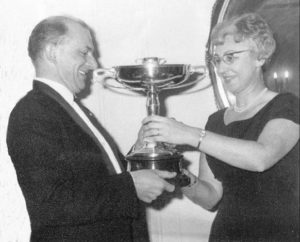
With their children growing up John Smith had staged a racing comeback in 1967. In 1968, to quote Joyce Smith, she returned not just to racing but also to actually riding a bike. As a young Joyce Wawman 15 years earlier, Joyce had been a useful member of the ladies’ team. Now encouraged by husband John and with the determination to succeed she rode her first Open 25 on the Southend road in June recording 1.14.41. John beat her that morning by 3 mins 41 secs but then he was riding a 30 miles time trial (and broke yet another club record). By the end of 1968 Joyce had reduced her time to 1.08.40, and finished 2nd fastest in an Open Women’s 10 run by the Addiscombe in conjunction with a Junior 10.
A dozen or more members were riding local time trials regularly. John Smith won the club’s Open 50 and with Doug Taylor and Colin Davies took the team award. Smith also won a 25 and 50 promoted by the SCCU and finished 3rd in a West London C.A. 50. Partnered by Davies the pair won the Viking Tandem 50 beating Mills and Paul’s 1939 club record by 21 secs. Smith also led Davies and Ron Shade to a team victory in the Bec 25 but although fastest rider in the interclub Purley / Brighton, the Norwood Paragon took the honours with the six fastest riders overall. The veterans Sid Armstrong, Jim Trenowden, Bill Boynton and Stan Harvey (another two making a comeback) were picking up age awards and team wins in local VTTA events. Eddie Mundy won a medal for fastest veteran in the University 100. Colin Davies took the Club Championship off Mundy only to see Mundy regain it the following two years.
For the first time the club had a rider placed in its Senior Open Road Race promotion with Larry Grimes coming in 2nd. Ron Shade had two wins in 1st cat. criteriums at Crystal Palace, and Grimes and Alan Franklin achieved a number of placings at Pirbright, Crystal Palace and Normans Park, Bromley. By the end of the 1968 season seven members were road racing regularly. Paul Emmerson, Graham Moss and Ron Shade took the track trophies, in fact Shade claimed the 5 miles Club Track Championship for six consecutive years. Larry Grimes ended his year with 4th place in the Cyclists v Harriers race on Farthing Downs.
At the annual dinner in January 1969 a special presentation was made to Sid Armstrong to mark his work within the club and to celebrate his forty years of time trialling. For a man who the medical profession had not expected to outlive his teens this was quite an achievement. This was a year when Stan Harvey not only kept the social side alive but also ran physical training sessions in the clubroom throughout the winter months. Family groups such as the Smiths, Trenowdens and Cockells helped boost the membership. Social runs were organised to give support to the racing members, often culminating in picnics and ad hoc football matches at Forest Green or swimming off Shoreham Beach. Over sixty attended one such picnic. Even though membership declined to just eighty-eight the enthusiastic support showed that club life was not just about winning events.
John Smith, riding a fixed gear of 82.8, beat a classy field to claim his first win of the 1969 season in the Viking 25. A regular supporter of Southern Counties events he also won one of their 25’s, with Joyce taking 1st handicap in the women’s event, and placed 2nd in the 50. His season mainly resulted in his finishing within the top five or six of any events whether he rode solo, tandem with Colin Davies, or two-ups with Davies or Ron Shade. Ex-member Sid Toole, now domiciled in Kent and riding for the Folkestone & District C.C. proved fastest in the Open 50, pushing Smith
Joyce Smith continued her time trialling come-back, 3rd fastest in the Festival 10, 2nd fastest in the Southern Counties 10 and fastest woman in the club’s Open 10 promotion for Women and Juniors. The junior section was given a boost with Jim Trenowden’s three sons joining Derek Pearce, Richard Waller and Stephen Cockell, the lads riding in several junior and schoolboys’ 10’s.
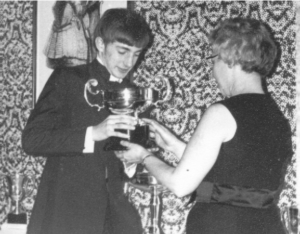
Ron Shade reached the semi-finals of the London Centre 4,000 metres pursuit championship before losing out to T. Ewing, Archer R.C. The Open road race in May 1969 incorporated the South West London & Surrey Division championships, Franklin and Grimes packing and Ron Shade taking a nasty spill. Shade and Larry Grimes rode in numerous criteriums and road races throughout the year either being well placed or packing! Grimes took 2nd place in the Old Kent C.C. 65 miles event for 3rd cats and juniors, Shade finished in the Chilterns 4-day, albeit well down but such were the weather conditions that half the field had packed on the first day. Alan Franklin won a June criterium at the Palace “before his Berlin trip”. The Gazette does not elucidate further.
Interest was generated around the South London clubs at the beginning of 1970 with talk of a 1 km road race circuit being established on waste ground at Sutton. Like many good ideas this came to nothing, the Council preferring the more financial benefit from office development.
1970 was the year women’s time trialling changed forever. The demise of separate men’s and women’s events meant that clubs could offer up to 20% of the field in their hitherto men’s events to women – they did not even have to offer a prize for the girls although most did. Apart from National Championships that were to retain their separate status it did mean that most events often only attracted two or three women, usually local riders, and some of Joyce Smith’s best rides received little recognition because of the lack of female competitors. On the plus side of integrated racing, women were able to test themselves against the men and develop their real potential. The women’s associations and a few promoters of Opens continued with separate-sex events.
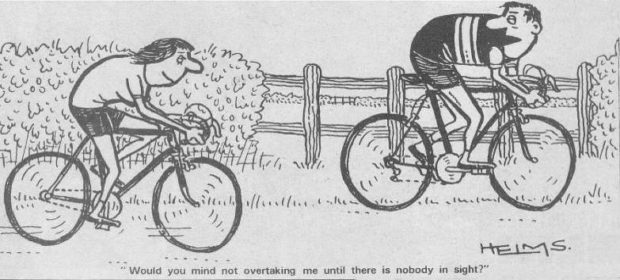
Following a winter of clubs runs led by Stan Harvey, it was an ever-improving Joyce Smith that emerged in 1970. She often found herself the fastest woman in an event and her times gradually improved to the point where she recorded 1.04.18 in the Hounslow 25 to break Daphne Grist’s club record of 1.05.36 that had stood since 1952. She also broke her own long-standing club 10 record in 25.31, set a new 30 miles time of 1.18.18 and only missed the club 50 record by 4 secs with an end of season ride of 2.14.42. It was definitely her best year ever with 6 “firsts”, 2 placings and 4 handicap awards. Riding in all three women’s national championships Joyce finished 9th in the 25, 14th in the 50 and 7th in the 100. Husband John contented himself with running the club events programme, riding the evening 10’s, acting as Joyce’s soigneur and mechanic, and looking after the kids! A handicap competition run on the five-club evening 10’s (average 18 riders per event) resulted in eight members completing all five events and Joyce Smith taking the overall award by just one second from Colin Davies. Eddie Mundy achieved a personal ambition in the West London C.A. 100 – to get inside 4.30 – 4.29.47 being his best ride since 1951. Sid Armstrong, now in his 63rd year – and his 42nd year of racing – was still performing well in VTTA events.
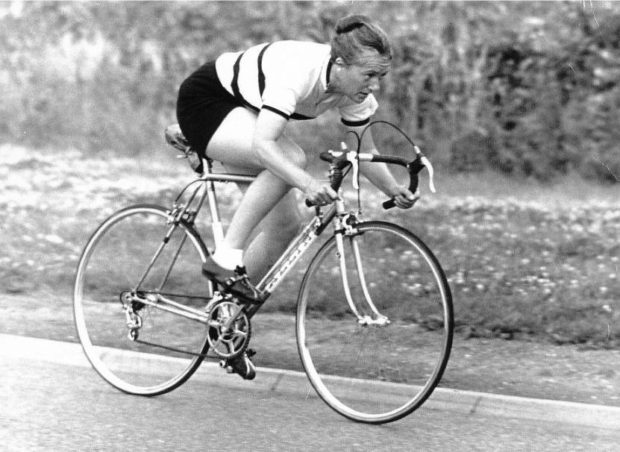
A criterium held on Madeira Drive ahead of the finish of the Round Britain “Milk Race” saw Ron Shade romp home in 2nd place. He had a good season generally and finished with 2 firsts, 2 seconds and 1 third placing. The juniors continued to perform well, Paul Filler breaking away in a 61-lap schoolboys’ race at Crystal Palace even though he finally had to settle for 2nd place. Nick Trenowden finished 3rd on two occasions in schoolboys’ events in October 1970, the Catford School Wheelers hillclimb and a De Laune cyclocross.
There was good support for track racing and all club championships were held. Paul Filler and David Evans were riding well in the Monday Competition and Stephen Cockell and David Evans reported on their riding on Calshott track.
In November 1970 several members rode to Harlow to support “the Scramble”, an event that included a pig roast and fun and games. Other members joined them by car and it is reported that Stephen Cockell won the pram race with David Evans as the baby! Autumn club events included the usual hill climb, two speed judging contests, and a free-wheel contest, all supported by members young and old including the four Smiths, five Trenowdens, four Watts and five Hintons, making them very much family occasions.
As new clubs sprung up so the turnover of members increased and so it was with the Addiscombe. Members came and went, some to another club; other interests were developed, or perhaps possession of a motor vehicle brought a halt to a youngster’s enthusiasm for his bike. The turnover of members became even more marked with the BCF’s recognition of commercial sponsorship and the establishment of trade teams as against the traditional club. Certainly by 1971 membership was down and new ways of fund raising and conserving expenditure were under discussion. Strange as it may seem, fund raising through the sale of ‘football tickets’, whereby the club received a reasonable percentage of sales and the organising football club the balance, had brought in a small but steady revenue. The sales though had depended on members having regular customers, usually workmates. Scratch cards had superseded football tickets but new ideas were now being sought.
A tombola held in conjunction with the 1971 annual dinner had proved so successful financially that the evening had more than broken even. Through the pages of The Gazette, Pat Mundy gave a detailed thank you to those who had made the dinner and prize presentation a success. While she was referring to one particular function her remarks could refer to any of our annual dinners. Apart from booking the venue a menu must be agreed, price of ticket fixed, tickets sold and speakers arranged. In 1931 there were ten speakers, in 1951 nine and by 1971 six. Trophies have to be collected in from the previous holders and got off for re-engraving, club medals engraved, menu and place cards printed and on the night it all has to come together for a smooth-running function. When most diners have finally departed the willing few clear up and should round up any uncollected trophies. Eddie Mundy can recount a tale of one that got mislaid in the 1970’s. The Southern Counties’ secretary approached him asking for return of the SCCU 100 miles Team Shield that the Addiscombe had won the previous year. Each member of the winning team was approached but all denied having brought it away from The Greyhound Hotel. In desperation, a phone call was made to the Manager of the Hotel. “Yes, they wondered if it was ever going to be collected” and a relieved Mundy retrieved the shield some nine months after the dinner! (Turn back to page 54 to view the shield that got “mislaid”! For the record, this shield has been won by an Addiscombe team on nine occasions, the last being in 2004.)
John Smith started the year of 1971 by winning both the Croydon & District C.A. and East Surrey R.C. Hardriders’ time trials but for the remainder of the season had to be content with finishing just outside the top three placings. Sid Armstrong, Colin Davies, Eddie Mundy, Ron Rand and Jim Trenowden were still performing against the watch. Davies finished runner-up to Den Grady, Bec C.C., in the SCCU 12 that gave him 4th place in the SCCU Best All-Rounder only missing 3rd place by 0.004 mph. Joyce Smith had another active season with several best performances by a woman in mixed sex events. Around this period the club had a good influx of younger riders who were shaping up well in club events, Jim Trenowden’s three sons Nicky, Colin and Ian, Stephen Cockell, Paul and Keith Filler, Mike Fitter and Steven Martin.
Paul Filler won the BCF South West London Division Junior Omnium Championship in August 1971, a very creditable performance. After winning the 10 laps Points race, gaining 26 out of a possible 30 points, and the 2-lap Sprint he then placed 2nd in the 6-lap Pursuit.
Addiscombe’s most consistent prizewinner of the year was Ron Shade. He won the Dulwich Paragon’s circuit race at Crystal Palace, recorded a personal best of 1.01.27 in the Bellingham Wheelers 25, and rode well in club events, resulting in him winning the 10 miles Handicap Competition. In the second of the club’s 25’s on the Gatwick course, Colin Davies complained that he had a job to catch Shade who had arrived at the start with just 10 secs. to go and had ridden the event in long trousers and duffle coat!
By 1972 with further expansion of Gatwick Airport and the consequent increase in traffic generated, the time trial courses were once again on the move. The Open 10 was held on the Gatwick circuit for the last time but the 50 had to move south with the HQ sited at Washington village. In the meantime, the District’s course designers and measurers, John Watts being one of them, were actively seeking alternatives in the Horsham area.
An AGM decision was taken to change the formula for the club events’ championship from a points system over 50 miles, 100 miles and 12 hours, to an average speed over 25, 50 and 100 miles. Stan Harvey continued to encourage members with his fitness programme and Dave Watson, the Australian Pro’ gave an interesting training talk at the clubroom.
Len Muller, President 1962-63, moved to Lincolnshire. He had been a great support to the club since its early days, and had also been ‘Mr Starter’ at Herne Hill for many years.
A new young member, Paul Tunnell, encouraged other youngsters to join in Saturday morning rides round the paths and bridleways of Croydon that were being led by CTC member Tony Prichett.
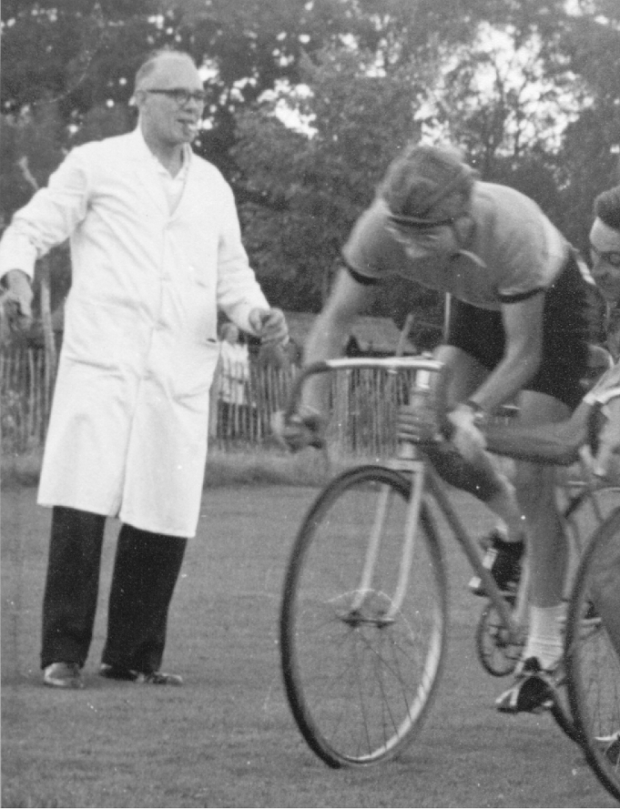
As far as time trials were concerned, the competitors were more or less the same as those of the previous year. John Smith was again the club’s best rider. He won the SCCU 100 and finished the season as the SCCU Best All-Rounder, 20 years after he first held the title and 15 years since his last win. Colin Davies was placed 3rd. Smith, Davies and Jim Trenowden also won the SCCU 100 and Best All-Rounder Teams. Smith placed 1st in the Catford 50 and Epsom 25, was runner-up to Dave Eldridge, Delta R.C. in the Addiscombe’s Open 50 and added two more club records to his CV, 57.21 for a 25 and 1.11.18 for a 30. Stephen Cockell finished 2nd fastest in the Farnborough Middlemarkers 25. Riding a 25 during Isle of Man week, Steven Martin received an award as fastest schoolboy. The club’s TT tally for the year was given as five 1st, four 2nd, and six 3rd placings, eight team wins and various handicap awards. The Addiscombe were pleased to beat the Norwood Paragon in the inter-club Purley to Brighton but it was decided this was to be the last event as the route was no longer considered satisfactory to use for competition.
Ron Shade had another good season, finishing 3rd fastest in the club’s Open 10 and, supported by John Smith and Stephen Cockell, leading the winning team. In massed start events Shade won a Festival R.C. event at Crystal Palace, a Woolwich C.C. promotion at Danson Park, and together with at least five other placings during the season moved up to become a 1st cat. Of nine members riding regularly at the Palace, five were schoolboys and Keith Filler usually managed a top ten placing. The schoolboys’ tally for 1972 was one 1st, four 2nd, and two 3rd placings. In the BCF Divisional Championship Omnium, Stephen Martin was placed 4th schoolboy and Nicky Trenowden 3rd junior.
Cyclocross was generally well supported, Paul Tunnell gaining a 1st and 3rd with the under-13’s, and Mike Parker scored at least three 1st placings, two 2nd and a 3rd in schoolboy events. Colin Trenowden was also competing with them. The club’s promotion was won by John Atkins riding for T.I.Carlton, with Keith Mernickle, sponsored by Chris Barber-Geoffrey Butler, second.
The club were sad to lose one of their finest competitors towards the end of the year. Ernie Mills had joined the club in 1931 as a raw novice and risen to international status in just five years. Despite Ernie developing multiple sclerosis, he and his family, had always maintained close ties with the club. A citation was presented to his wife Muriel at the following club dinner and a memorial trophy organised that would become part of the new Open 25 promotion.
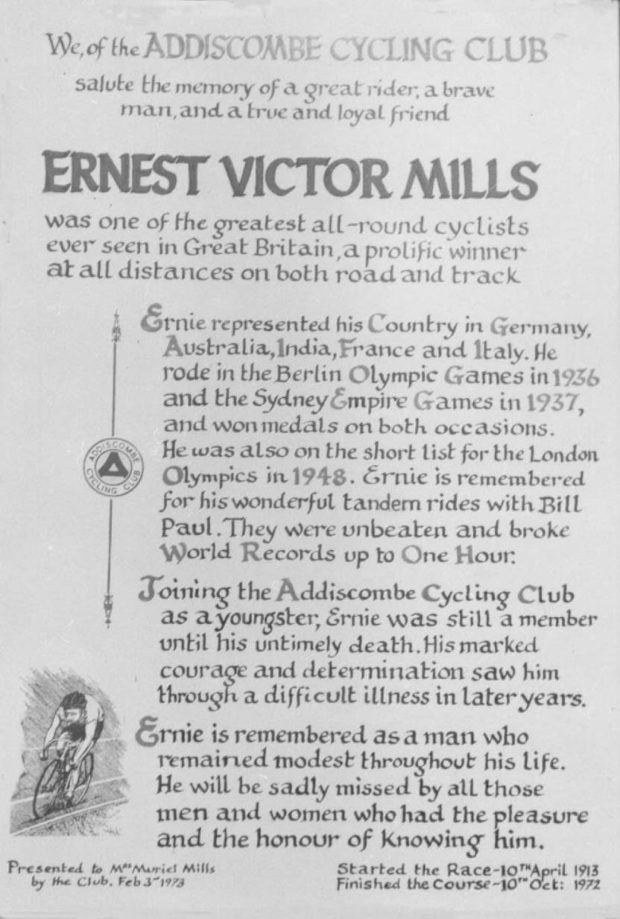
1973 saw the compulsory introduction of helmets for road and circuit racing. At club level Stan Harvey continued his talks on training methods and Steve Cockell volunteered tuition on the repairing of tubular tyres; they were too expensive to just throw away if you punctured. Faster time trials being recorded on courses outside London South District had attracted the attention of both Addiscombe’s riders and officials and in consequence the Club 10’s were moved to the Polhill course (South East District), the new Open 25 was held in Essex (London East District) and the Open 50 moved to the Bath Road with a 3 pm start (London West District) leaving only the Open 10 in London South on the new Southwater course.
The early 1970’s were outstanding for the rides by the juniors and schoolboys. Michael Perry, riding for Horley County Secondary, in the RTTC’s GHS Memorial Schoolboys’ 10-mile championship of 1972, had won the District Heat and finished 3rd in the National Final run off at Stourbridge. Claude and Betty Perry had allowed their membership to lapse while the family were growing but in 1973 re-joined the club together with their sons Michael, Christopher and Matthew.
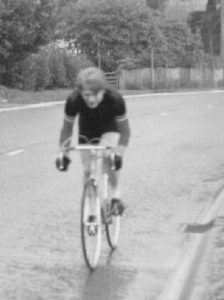
Michael Perry, now riding for the Addiscombe, was soon picking up junior awards and frequently found himself battling with his own clubmate Stephen Martin for 1st and 2nd place. In an Eastern Counties C.A. 10, Martin, Perry and Mike Parker took the team, and both schoolboy and junior club records were broken. Some clubs ran specific events for juniors and/or schoolboys while others started giving section awards, a trend that has continued.
A team rode in the National Junior 25 Championship of 1973. Stephen Martin and Michael Perry tied for 8th place with 59.04 and Mike Parker finished in 1.05.11. They were the second fastest team. In the RTTC’s National Junior Trophy Competition based on a rider’s two best 10’s and two best 25’s of the season, Martin placed 4th, 26.55 mph, with Perry close behind in 6th position, 26.459 mph. The following season, 1974, with both riding as juniors, Martin took the club senior and junior 10 records with a ride of 21.35 in the Fenland Clarion 10, and was the club’s highest placed rider in the National Junior 25 Championship finishing 8th. Perry took fastest junior and 5th overall in the Addiscombe Open 25 with a new club record of 55.47, the event being won by Alf Engers, Archer R.C. in 54.24. To complete their year, in the National Junior Trophy Competition Martin finished in 2nd place with qualifying rides of 21.35, 22.06, 56.05 and 56.54, average speed 27.014 mph, and Perry placed 3rd, 22.12, 23.01, 55.47, 57.10, average speed 26.556. In the RTTC’s published table showing the top sixty competitors in this junior competition four Addiscombe are listed with Parker placed 35th and Gary Harrison 53rd. At the other end of the age range Stan Harvey, Claude Perry, Jim Trenowden, Sid Armstrong and John Smith supported the VTTA events with the latter two winning all the Surrey/Sussex team awards and Smith taking the Group’s BAR title.
The club scrapbook also shows that the same Addiscombe youngsters were picking up awards in circuit races. In cyclocross events Michael Gill, Gary Harrison (schoolboys), Michael Parker and Colin Trenowden (juniors) had their moments of glory. Paul Tunnell, riding for Ashburton High School, won the under 13’s English Schools’ cyclocross.
Stephen Martin and Michael Perry were still rated amongst the best junior time triallists in the country in 1974 and looking at results they were also being well placed in events open to all ages. An example of how the separation of events for men, juniors and schoolboys did not always show the youngsters up to their true potential is the Peterborough 10. The men’s event was won in 22.26 with second fastest 22.51. The junior event was won by Martin in 22.37! In the Rockingham Open 25 Martin reduced his 25 time to 56.54, finishing 3rd fastest. The junior riders deserved the highest praise for their performances of the past few years and it is to be regretted that it is not possible to itemise all their wins and placings.
For a few years “Cycling” ran a competition based on six selected 25’s throughout the season, the winner receiving the Campagnolo trophy. For the second year running the Addiscombe Open 25, promoted by Stephen Cockell, was a selected event. Alf Engers, Archer R.C., national 25 champion and an outstanding rider over the distance, won the event in 54.24. John Smith had started first man off and finished with a new club record of 56.04 only to see it broken 36 mins. later by Michael Perry who returned in 55.47 to finish 5th fastest and 1st junior. John Patston, Birmingham R.C.C., won the Cycling-Campagnolo series for 1974 with Michael Perry the best junior competitor overall. Teams entered three National Championships, the Men’s 25, the Men’s 100, and the Junior 25 where Stephen Martin placed 8th fastest.
John Smith was still turning out some good times. In the Essex Roads 30 in June he was 2nd fastest with 1.07.48, took 2nd handicap, as well as setting a new Veteran’s national record and club record. Closer to home, he won the SCCU 100, and in appalling weather conditions was third in the SCCU 12. With Jim Trenowden and Eddie Mundy, the Addiscombe won the team for the third consecutive year, the last occasion the Southern Counties would promote the 12 hours event.
The initial stage of the Tour de France had been brought to Britain in 1974. The club’s “camping section” had travelled to Devon to see the riders in action on the soon to be opened Plymouth by-pass and also took the opportunity to participate in a few local races.
On the track, Stephen Cockell, Ian Thompson and Paul Tunnell were getting placings in Monday Comp’ events and in circuit races Thompson, Tunnell and Mike Parker were achieving placings in their age-related groups. Parker was placed 2nd in the BCF South East Division junior championship.
Membership stood at 109 with 30 racing regularly. Percy Huggett retired after 35 years as club treasurer, in addition to having served as general secretary, racing secretary, captain, timekeeper and President.
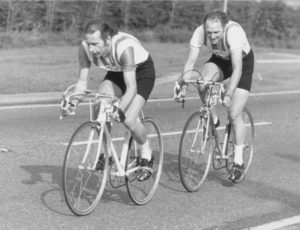
The Delta R.C. wound up at the end of 1974 and several of their members joined the Addiscombe, among them, Dave Eldridge, Sid Honeyball and Allan Morris. Dave Eldridge had already ridden some very good time trials with the Delta, and in 1975 he went even faster, smashing the Addiscombe’s club records on the way. His 25- and 100-miles times (51.45 and 3.52.41) are still club records over thirty years later. Eldridge started the 1975 season with a win in the East Surrey Hardriders “33” and with John Smith & Michael Perry took first team award. Mike Parker finished 3rd in the Hardriders Junior “12” held the same morning. By the end of the year Eldridge had amassed seventeen solo wins in Open events, another 1st in the ‘34 Nomads 2-up with John Smith and had led fifteen team wins. Making up the various teams were Smith, Perry, Honeyball, Parker, Stephen Cockell, Chris Cowlard and Jim Trenowden. Discounting veterans’ awards, the men had also achieved thirteen 2nd and twelve 3rd places.
Dave Eldridge’s outstanding ride was in the Goodmayes 100 in Essex when he knocked 20 minutes off club record to finish in 3.52.41. John Smith and Sid Honeyball finished with 4.05.56 and 4.30.17 respectively to complete the winning team and Chris Cowlard was not far behind with 4.34.23. All four recorded personal bests. The Cycling journalist reported conditions that morning as ‘dreamlike’. Certainly, Beryl Burton, Morley C.C., found them to her liking as she finished third fastest overall in 3.59.51!
The Club’s 1974 promotions failed to provide an Addiscombe win. In the Open 10 Pete Wells of Unity C.C. beat Dave Eldridge by 13 seconds for first place. The Open 25 fell to John Patston of Birmingham R.C.C. with 54.33. Eldridge was the club’s best-placed rider in 8th position, 55.34, and John Smith finished fastest veteran with 56.52. In the 50, held again in London West District, Mick Clothier of Bath C.C. pushed Eldridge and Smith down into 2nd and 3rd positions. With Michael Perry they finished fastest team.
After shadowing Dave Eldridge in time trials, picking up a number of veterans’ awards on the way, John Smith was fastest rider in the late season Surrey/Sussex VTTA 25. On standard Sid Armstrong was 1st, Smith 2nd, and it was another team win. The annual tally for veterans’ awards was ten 1st places, six 2nd and two team races. Joyce Smith was still riding the occasional event.
Track and road race reports were sparse around this period and nobody was keeping the scrapbooks going so historical research has proved more difficult. What are well documented are the time trial results of the competitors. Whether they were placed first or last in an event, their names and performances are on record.
Mike Parker went one place better to win the 1975 BCF South East Division junior championship at Farnham. He also won an event promoted by the Southborough Wheelers and had several placings to his credit. Others racing at this time were Gary Harrison, John Hill, Steve Cockell and Ron Shade.
Pat(rick) Lacey moved over from the Clarencourt C.C. to the Addiscombe at the beginning of 1976 and with Dave Eldridge and John Smith made a formidable team, notching up eight victories. Eldridge won no less than eleven solo time trials plus two 2-ups with Smith. Smith also won the early season South Eastern C.A. 24 miles 2-up paired with Ken Howlett and the South Eastern R.C. 33 miles 2-up riding with Dave Bull. Smith was a strong counter in eighteen of the twenty-one team wins the Addiscombe scored that year, took various veterans’ awards, finished the season as Southern Counties BAR yet again and with Pat Lacey and Roger Williams the Addiscombe annexed the Counties BAR team. (From 1976 with the 12-hour race no longer promoted, the counting events for the Southern Counties BAR were changed to 25, 50 and 100 miles.)
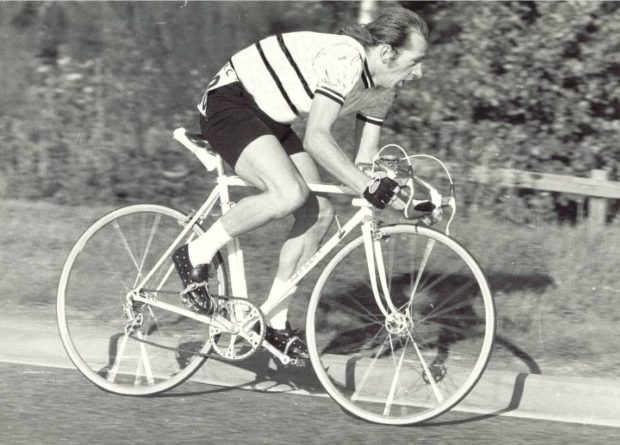
At 70 years of age, Stan Harvey proved he could still turn a nifty pedal. As well as taking team awards on standard with both Eddie Mundy and John Smith, he went over to the Isle of Man and rode in two veterans’ events, then came back to the mainland to record 2.22.59 to take the VTTA 50 Championship. Harvey finished his season by getting the veterans’ national age-related record at 100 miles, 4.56.00, and 12 hours, 221.546 miles. Sid Armstrong, by then 69 and retired to Dorset, joined Eddie Mundy to ride a VTTA 2-up in the October.
It was twenty-one years since the club’s 24 hours trophy had been awarded and Chris Cowlard had been getting the miles in. In the East Sussex C.A. 100, with Roger Williams and Sid Honeyball he helped take the team award, then the following month rode his first 24, the North Road C.C. promotion. Despite rough weather during the night, Cowlard finished with a ride of 407.226 miles.
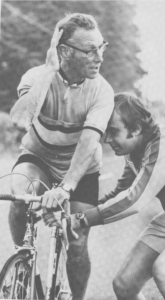
Dave Bull was another rider showing potential. He won the C.C. Bexley Middlemarkers 25, joined John Smith and Angus Litterick as the winning team in the Redmon’s 73 miles time trial and then recorded an excellent 56.07 in the South Eastern C.A. 25 in June. Road racing proved an even greater attraction, and he was well placed in numerous events where he rode frequently with Litterick, Steve Finnimore and Steve Greenslade.
Dave Bull continued his progress in 1977. In the South West London Championships, run off at Leigh, he placed 3rd in an overflow 3rd cat. event. In the junior championship Graham Morris was 9th, a position he repeated in the Jubilee road race at Ellens Green. Bull was up against stiffer opposition in the Fred Cowley Memorial race for 1/2/3 cats. when he claimed 5th position, gained a 4th in a Dulwich Paragon event at Leigh and was 6th, just ahead of George Clare, in a 1/2 cats. 80- mile race on “the fearsome Woldingham circuit”. Over the August Bank Holiday weekend Bull rode in his first stage race, the Tour of the Hop Fields. This had attracted a first-class amateur field and Bull finished 9th overall.
With the fast juniors of the earlier 1970’s having grown up and Dave Eldridge now resident in Essex, in 1977 it was left to John Smith to take the lead once again. Apart from being the fastest rider in several of the VTTA events, including the VTTA Championship 10, he frequently took the age standard award and with Jim Trenowden and Gerry Marks won the team award in the VTTA London 25.
Two veterans’ age-related records were claimed in the Eastern Counties 100. John Smith at 46 years of age recorded 4.07.58 and Stan Harvey, 71 years, 4.55.28. Smith went on to take the VTTA BAR title for 1977, the Southern Counties BAR title for the tenth and last time, 26 years after his first win, and was club champion for the twelfth time.
Joyce Smith recorded her fastest 25 for some years with 1.06.14. Graham Morris was fastest junior over 10 miles with 23.59 and Paul Tunnell, riding a 72-inch fixed gear, took the junior 25 miles trophy with 1.03.21. At the longer distances John Smith set a new club 12 hours record with his 256.26 in the Eastern Counties 12. Sid Honeyball finished with 235.76 miles. Allan Morris was the club’s only participant over 24 hours recording 383.03 miles.
The club’s Open 10 and 25 were both won by Mick Burrow, ’34 Nomads C.C. In the 25, Dave Bull was 5th, John Smith 6th and with Pat Lacey they took the team award. The need to promote the Open 50 nearer to home meant it was not held in 1977.
In recognition of her services to the Addiscombe since its inception, Eva Davey, widow of Charlie Davey, accepted the title of President for the club’s 50th year. Her formal election took place at the November 1977 AGM but sadly at the age of 90 she died a month later.
By 1978 the Addiscombe may not have been achieving national honours but at least the camaraderie was still there, and competition was keen, at the dartboard as well as on the bike. In the South London Darts League from the initial 64 players the individual title was fought out between two Addiscombe members with Gerwyn Evans seeing off Colin Trenowden in an exciting and closely fought final.
The most outstanding time trials were Dave Bull’s first 100 in 4.19.13 in the Eastern Counties event, taking 2nd fastest and 3rd handicap. John Smith was 4th, and with Pat Lacey they won the team award. In the club’s Open 50 Smith was fastest with 2.09.09, Lacey 2nd and Bull 3rd and in the Epsom 25 the same three scored their third team win of the season. A full field for the Open 10 resulted in a win by Alf Engers, Unity C.C., in 21.33. Addiscombe had eleven riders with Bull highest placed, 23.06. Smith continued amassing veterans’ awards and Stan Harvey collected three more VTTA age records. Now aged 72 he recorded 2.23.49, 5.01.40 and 215.70 miles for the 50, 100 and 12 hours. In the October Eddie Mundy (aged 54) and Sid Armstrong (71) rode in the VTTA West Group 2-up 25 and took an award as the oldest pair. The same month, promising young rider and active committee member Ian Bamford was involved in a road accident that left him partially paralysed.
Road and circuit races were contested by Dave Bull, Paul Tunnell, Glyn Durrant, Angus Litterick and Martin Cory. Bull’s best circuit race at Crystal Palace was in a Rodney C.C. promotion when he managed to get away with Tony Doyle, Clarence Wheelers. Bull finished 2nd after the pair had lapped most of the field. His win came in July in a 2 / 3 cat. event promoted by Marlborough A.C. Durrant’s road racing season was a medley of mechanical failures, punctures and spills, but he had better success in the evening club time trials where he won the Handicap Competition.
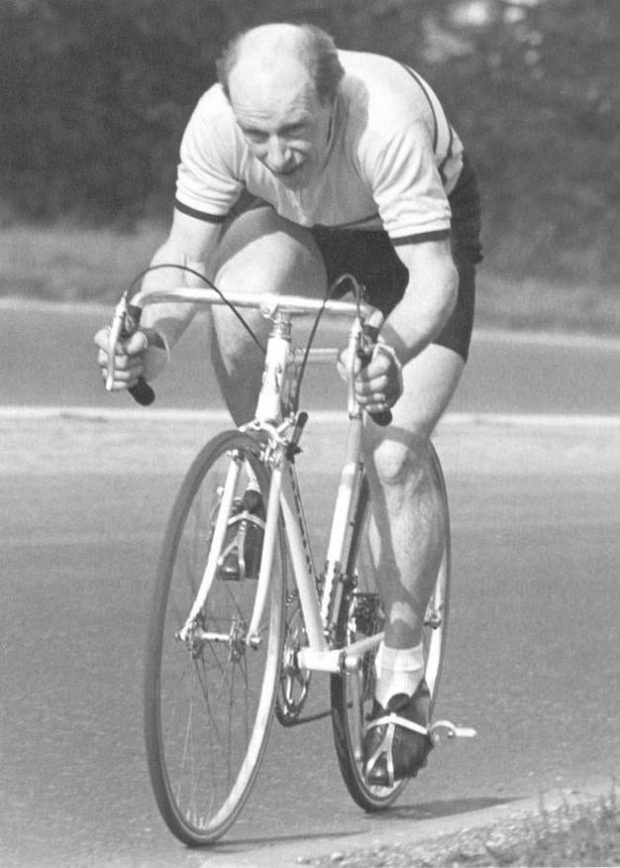
The dinner to celebrate Addiscombe’s Golden Jubilee year took place in February 1979 with John Smith taking the Club Championship trophy for the thirteenth and last time, his first win having been in 1952. Jim Walsh, Redmon C.C. proposed the toast to the club and Stan Butler, Norwood Paragon C.C., responded on behalf of the visitors. Nearly 200 members and friends were present.
- An Introduction to our History
- The 1883 Addiscombe Cycling Club
- The 1906 Addiscombe Cycling Club
- An Historical Background to the Road Record Associations
- A Brief Historical Background to Cycling Time Trials
- The Club’s Revival, 1929 to 1939
- The Club in Wartime, 1940 to 1946
- The Post-War Years, 1947 to 1957
- Post-War Track and Roller Racing
- The Men in Post-War Time Trials
- The Women in Post-War Time Trials
- Post-War Closed Circuit and Road Racing
- An Influx of New Riders and the Passing of a Statesman, 1958 to 1964
- The Club Heads Towards its Golden Jubilee, 1965 to 1978
- Membership Declines, 1979 to 1987
- The Arrival of the Young Mountain Bikers, 1988 to 1994
- Another Period of Declining Membership, 1995 to 1999
- New Century and a New Look for the Addiscombe, 2000 to 2006




